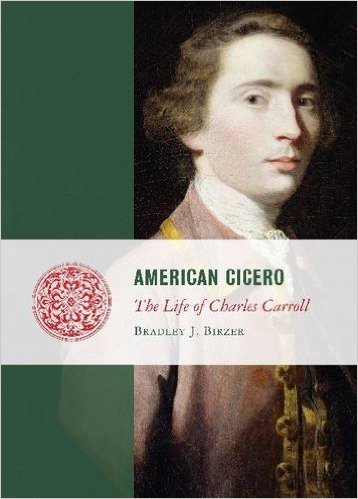
ISI Books, 2010.
I was just asked by a group in France to describe three aspects of Charles Carroll of Carrollton’s thought and life. Nice. I’ve not given a lot of thought re: him for several years. Kind of like visiting an old friend.
For what they’re worth, here are my three thoughts.
1. Born a bastard (only because of anti-religious laws) to a wealthy Roman Catholic couple in Maryland, Charles Carroll and his cousin, John Carroll (later the first archbishop in the United States) , left Maryland for education at St. Omer while still young boys. Charles, however, stayed in Europe for nearly two decades, before returning to the American colonies in 1765. Because of Maryland law, Roman Catholics could not educate their children or raise their children in the Catholic Church. To do so risked confiscation of the children by Protestants. Additionally, Roman Catholics could not serve in politics or law (even as witnesses in crimes), but they could rather tenuously hold property. Upon returning to Maryland in 1765, the now highly educated Charles began to involve himself in various clubs and societies in Maryland, eventually revealing his profound philosophical side in the famous 1773 debates regarding taxation and religious authority. Charles emerged from these debates a republican patriot and hero. As Maryland moved toward independence from Britain, 1774-1776, Charles emerged as its champion and the anti-Catholic laws faded quickly in revolution.
2. Because of the insistence of his father and the education the Jesuits provided him at St. Omer, Charles was fiercely humane and liberal in his education. He knew, for example, Cicero as well as he know Montesquieu, and he deeply admired both. That is, he saw his current life not as a break from the past, but as an extension of it. When he signed the American Declaration of Independence, he believed he was doing so as a representative of the liberally educated from Socrates to the present. While Charles was extreme in this belief, he was not unique. Most of American founding fathers had received an intense liberal education in Greek and Latin.
3. Throughout his life, Charles remained a republican, but he was certainly not a democrat. That is, he believed that the best free society worked when its members willingly gave of themselves to the common good. When they began to focus only on their own advancement or rights, society decayed quickly. As much as Charles liked Thomas Jefferson personally, he feared that Jefferson was simply too radical to lead the United States, and he feared that Jefferson’s passions would lead to the undoing of American liberty and republicanism. Because Carroll lived to the age of 95, he had the privilege of being the last of the signers of the Declaration of Independence to pass away. In the early 1830s, he even met the greatest of all analysts of American society, Alexis de Tocqueville, and served as one of the French writer’s main informants. The two men had almost identical views of American democracy. It was beautiful, but it was also quite fragile.
To order AMERICAN CICERO: http://isibooks.org/american-cicero.html